|
|
|
Sort Order |
|
|
|
Items / Page
|
|
|
|
|
|
|
| Srl | Item |
| 1 |
ID:
089386
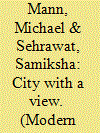

|
|
|
|
|
| Publication |
2009.
|
| Summary/Abstract |
Despite the contemporary importance of the Ridge forest to the city of Delhi as its most important 'green lung', the concept of urban forestry has been explored neither by urban historians studying Delhi nor by environmental historians. This article places the colonial efforts to plant a forest on the Delhi Ridge from 1883 to 1913 within the context of the gradual deforestation of the countryside around Delhi and the local colonial administration's preoccupation with encouraging arboriculture. This project of colonial forestry prioritized the needs of the white colonizers living in Delhi, while coming into conflict repeatedly with indigenous peasants. With the decision to transfer the capital to Delhi in 1911, the afforestation of the Delhi Ridge received a further stimulus. Town planners' visions of a building the capital city of New Delhi were meant to assert the grandeur of British rule through imposing buildings, with the permanence of the British in India being emphasised by the strategic location of the ruins of earlier empires within the city. The principles of English landscape gardening inspired the planning of New Delhi, with the afforestation of the Delhi Ridge being undertaken to provide a verdant backdrop for-the Government House and the Secretariat-the administrative centre of British government in India. Imperial notions of landscaping, which were central to the afforestation of the Delhi Ridge epitomised colonial rule and marginalized Indians.
|
|
|
|
|
|
|
|
|
|
|
|
|
|
|
|
| 2 |
ID:
192183
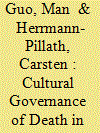

|
|
|
|
|
| Summary/Abstract |
For decades, funeral reform has been a key concern for cultural governance in China as the state has attempted to manage “feudal” and “superstitious” practices and economize resources such as land devoted to cemeteries. We analyse the status of funeral reforms in Shenzhen, combining general observations with a case study of an urban village. We show how the business of funeral service providers mediates between cultural governance and grassroots-level needs and demands, resulting in distinct forms of ritual hybridization. In the case of native villagers, we observe the bifurcation of rituals at the central municipal parlour and at the home of the deceased. For understanding the adaptability of death rituals under the regime of cultural governance, it is essential to distinguish between funeral rites and their modular structure on the one hand, and rites for the disposal of the body on the other.
|
|
|
|
|
|
|
|
|
|
|
|
|
|
|
|
| 3 |
ID:
142572
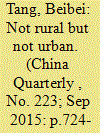

|
|
|
|
|
| Summary/Abstract |
China's urbanization has created a large number of urban villages which, although they have been transferred to urban administration, have maintained their collective economies. Using a comparative perspective, this article investigates how villagers, the village collectives and the urban administration organize community governance in three urban villages on the fringes of the cities of Guangzhou, Wuhan and Shenyang. The findings suggest that successful village collective shareholding companies play a leading role in community governance by providing villagers with economic and social welfare, subsidizing community administration services, and mobilizing residents. The comparative analysis also shows that village shareholding companies employ different mechanisms based on the varied histories of their village collective economies, the ability of the village collectives to mobilize resources, and the degree to which the village collectives are engaged in the grassroots administrative structure. The article argues that the “not rural but not urban” governance mode of the urban villages illustrates China's fragmented urbanization planning. At the same time, it illuminates the dynamics of state–society relations during China's urbanization and how landless villagers and village collectives respond to urban transformation by adopting different strategies to preserve their individual and collective interests.
|
|
|
|
|
|
|
|
|
|
|
|
|
|
|
|
| 4 |
ID:
178310
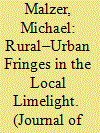

|
|
|
|
|
| Summary/Abstract |
As urbanisation strategies have been adopted throughout China in recent years, it has become increasingly relevant to study their implementation processes in so-called lower-tier cities away from the well-known regions. Urbanisation has given rise to different types of settlements for landless peasants: planned resettlement neighbourhoods, as well as more or less accidentally grown urban villages. While resettlement is widely adopted and positively propagated, urban villages are usually only seen as soon-to-be demolished “non-places” and their residents are often stigmatised. This article focuses on a case in Yinchuan, the capital of Ningxia Hui autonomous region. It analyses the demolition process of Yingnan village and its lead-up and finds that despite this general discursive framework, exposure on a local TV show and low scores on a national “civilised cities” ranking pressured the local government to not ignore Yingnan village as merely a “non-place” but to invest in better sanitary conditions and speed up redevelopment.
|
|
|
|
|
|
|
|
|
|
|
|
|
|
|
|
| 5 |
ID:
177963
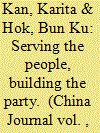

|
|
|
|
|
| Summary/Abstract |
The reform era has been associated with the waning authority of the Chinese Communist Party in urban society. While existing studies have investigated the Party’s self-reinvention through the incorporation into its ranks of professional groups and the new socioeconomic elite, much less attention has been given to how the Party has rebuilt its presence in neighborhoods among urban residents and migrant communities. Drawing on a case study in Kunming, this article argues that the Party has sought to deepen its territorial reach and regain political relevance by emphasizing welfare provision and service delivery at the grassroots. The rise of service-centered Party-building has seen increased co-optation of previously independent social organizations as “partners” and “collaborators” in service provision. Enrolling NGOs enables the Party to both revamp its image as a paternalistic redistributor and regain its ability to mobilize the masses through appropriating the vocabulary of participation and volunteerism that social organizations espouse. If in co-opting the professional and business elite the Party has successfully fused Party authority with market power, at the urban grassroots it has appropriated social forces to reestablish its presence and bolster its legitimacy, with important implications for the autonomy and professionalism of NGOs.
|
|
|
|
|
|
|
|
|
|
|
|
|
|
|
|
| 6 |
ID:
109109
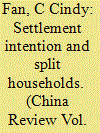

|
|
|
| 7 |
ID:
169830


|
|
|
|
|
| Summary/Abstract |
“Comparing China, India, and Brazil reveals that current housing policies in all three countries have produced new forms of exclusion for inhabitants of informal settlements.”
|
|
|
|
|
|
|
|
|
|
|
|
|
|
|
|
| 8 |
ID:
147827
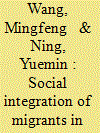

|
|
|
|
|
| Summary/Abstract |
Through questionnaire investigation and factor analysis, this article
explores the status of social integration of migrants in Shanghai’s urban
villages. �e results show that social integration of migrants can be
mapped on four dimensions: social relation integration, economic integration,
psychological integration, and cultural integration. According
to the factor scores, the overall level of social integration of migrants is
not high, and economic integration is the lowest. Furthermore, the
results of multiple linear regression analysis show that, on the whole,
the destination place factors of migrants exert more in�uence on social
integration in urban villages than the individual factors. Individual
factors play the most important roles in determining the status of
psychological integration,
|
|
|
|
|
|
|
|
|
|
|
|
|
|
|
|
|
|
|
|
|